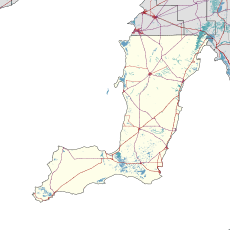Edithburgh
|
Edithburgh South Australia |
|||||||||||||
|---|---|---|---|---|---|---|---|---|---|---|---|---|---|

Edith Street
|
|||||||||||||
| Coordinates | 35°05′0″S 137°44′0″E / 35.08333°S 137.73333°ECoordinates: 35°05′0″S 137°44′0″E / 35.08333°S 137.73333°E | ||||||||||||
| Population | 466 (2011 census) | ||||||||||||
| Established | 1869 | ||||||||||||
| Postcode(s) | 5583 | ||||||||||||
| Location | |||||||||||||
| LGA(s) | Yorke Peninsula Council | ||||||||||||
| Region | Yorke and Mid North | ||||||||||||
| County | Fergusson | ||||||||||||
| State electorate(s) | Goyder | ||||||||||||
| Federal Division(s) | Grey | ||||||||||||
|
|||||||||||||
| Footnotes | Adjoining localities | ||||||||||||
Edithburgh /ˈiːdᵻθbɜːrɡ/ is a small town on the south-east corner of Yorke Peninsula in the Australian state of South Australia. Edithburgh is about 50 km (31 mi) west of Adelaide across Gulf St Vincent, but 226 km (140 mi) away by road. At the 2011 census, the town had a population of 466.
Edithburgh is in the Yorke Peninsula Council, the South Australian House of Assembly electoral district of Goyder and the Australian House of Representatives Division of Grey.
In the Narangga language of the indigenous Narungga people, Edithburgh was known by the place name Pararmarati. Some sources give the pronunciation 'Barram-marrat-tee'. The first European pioneers arrived in the 1840s and were sheep graziers and pastoralists. With closer settlement, in 1869 the Marine Board fixed a site for a jetty to service the developing farming district. An adjacent town was then surveyed, the layout closely emulating (on a smaller scale) that of Adelaide, with a belt of parklands. Edithburgh was named by Governor Sir James Fergusson after his wife Edith. The new jetty opened in 1873.
Edithburgh originally developed as a port for servicing the pastoralist pioneers. In the 1870s grain farming became a mainstay of the local economy, which it still is. At the turn of the 20th Century additional industries were established in the form of gypsum mining and salt refining. There are vast salt lakes in the area, from which salt was scraped and exported as far as Russia. Among those refineries was the Standard Salt Company, operated by C.T. McGlew. The jetty became a busy hub for exporting these commodities, as well as unloading supplies.
...
Wikipedia

